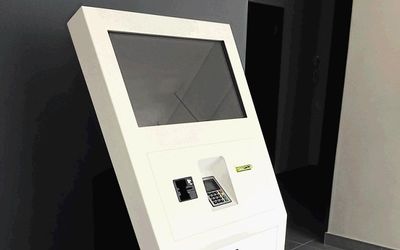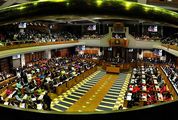Kiosk at hand is just the ticket
by Lorelle Bell,
2015-11-10 05:50:39.0
A KIOSK was installed last month at the Cape Town Civic Centre MyCiTi bus station that allows passengers to buy a card for bus trips using touchscreen technology.
This payment method might not seem novel — a version is used to issue Gautrain cards. But the electronic platform powering the kiosks has the capacity to extend the MyCiTi offering to other products and services using the same card.
Commuters can buy airtime and electricity and pay their municipal bills. When a version was introduced as part of a contract to manage a card payment system for Multichoice, the uptake was greatest in remote areas.
For the developer, Kinektek CEO Matthew Slaven, the installation of the pilot kiosk is the culmination of a dream.
Mr Slaven was working for Nedbank in 2003 when it launched its Mzansi card. He says the bank gave a lot of thought to the design, pricing and issuing of the cards, but little attention was paid to how people might use them.
This dichotomy sparked Mr Slaven’s departure. "I wanted to develop a transactional self-service kiosk that would enable people to access a broad range of products — from airtime and electricity to utility payments, genral account payments, plane and bus tickets, movie tickets, and even allow people to access, complete and submit government forms. The kiosks would be placed in convenient locations near where they lived, worked and commuted, and payments would be made using their Mzansi card to avoid the risks and costs of transacting in cash."
Kinektek developed a technical solution that worked. But it needed a viable financial model and the resources to develop an extensive distribution network.
"Our pockets were not deep enough to fund the hardware infrastructure and our site owners (unemployed women) were hardly in a position to help fund the terminals."
Multichoice provided an opportunity to refine the product and test it in the market, with a contract to provide a platform that would run a network of self-service kiosks to collect payment and perform other services.
"The rapid success of this solution surprised everyone, not least of all ourselves."
Within nine months, the platform was collecting more than 90% of all Multichoice payments made at branches and agencies.
"Up until this point, there had always been a lot of scepticism regarding the extent to which the South African public would adopt a self-service, touchscreen kiosk for performing transactions," Mr Slaven says.
"But what we found is that often the busiest machines are in the most remote locations and frequently exceed 300 transactions per day. Today, we have terminals in the northern Caprivi Strip doing these volumes every day. We’ve processed roughly R2.5bn in transactions and the opportunities and use cases are growing virtually daily."
The 2010 World Cup provided another opportunity to develop the system. Partnering with Tutuka (a prepaid card processor) on the Visa World Cup project, Kinektek provided a card-dispensing and value-loading solution for devices that were installed in shopping malls to dispense gift cards.
This drew Kinektek’s attention to the network and distribution opportunities offered by the integrated transport network.
"We saw that the implementation of transit card solutions for the new Bus Rapid Transit (BRT), taxi and train tickets require a massive network of card dispensing and load points around the country," says Mr Slaven.
Kinektek has developed and managed solutions that include the first cash-recycling ATMs in SA — for gaming companies — and the first card payment and dispensing kiosks. Its touchscreen system is being applied to a pharmaceutical vending machine.
Mr Slaven says the MyCiTi pilot is a particularly exciting venture. "It creates a commercially viable mechanism to place a large network of terminals in extremely convenient locations for the public. This, in turn, enables us to explore opportunities to revisit the initial vision of combining the commercial services available on the kiosks with a suite of social and community services.
"Due to the extendable design of our solution, a network of value load terminals running on our platform can very simply be extended to provide access to a range of municipal services.
"One can think of things ranging from reporting electricity faults to consumer surveys, paying accounts, service requests, licence renewals, registering for social services and benefits.
"We see the terminal infrastructure, if it is implemented in the correct way, as providing a platform for access to all government services," he says.
"We can realistically engage with local government and others to discuss how we can collaborate to design and deliver a real full-service solution that becomes part of the fabric of how people, government and businesses interact and transact with one another."

A smarter way for ordinary people to do anything from buying an urban bus ticket to paying municipal bills and seeing to many other financial chores, is the focus of Kinektek’s Matthew Slaven. Picture: SUPPLIED
A KIOSK was installed last month at the Cape Town Civic Centre MyCiTi bus station that allows passengers to buy a card for bus trips using touchscreen technology.
This payment method might not seem novel — a version is used to issue Gautrain cards. But the electronic platform powering the kiosks has the capacity to extend the MyCiTi offering to other products and services using the same card.
Commuters can buy airtime and electricity and pay their municipal bills. When a version was introduced as part of a contract to manage a card payment system for Multichoice, the uptake was greatest in remote areas.
For the developer, Kinektek CEO Matthew Slaven, the installation of the pilot kiosk is the culmination of a dream.
Mr Slaven was working for Nedbank in 2003 when it launched its Mzansi card. He says the bank gave a lot of thought to the design, pricing and issuing of the cards, but little attention was paid to how people might use them.
This dichotomy sparked Mr Slaven’s departure. "I wanted to develop a transactional self-service kiosk that would enable people to access a broad range of products — from airtime and electricity to utility payments, genral account payments, plane and bus tickets, movie tickets, and even allow people to access, complete and submit government forms. The kiosks would be placed in convenient locations near where they lived, worked and commuted, and payments would be made using their Mzansi card to avoid the risks and costs of transacting in cash."
Kinektek developed a technical solution that worked. But it needed a viable financial model and the resources to develop an extensive distribution network.
"Our pockets were not deep enough to fund the hardware infrastructure and our site owners (unemployed women) were hardly in a position to help fund the terminals."
Multichoice provided an opportunity to refine the product and test it in the market, with a contract to provide a platform that would run a network of self-service kiosks to collect payment and perform other services.
"The rapid success of this solution surprised everyone, not least of all ourselves."
Within nine months, the platform was collecting more than 90% of all Multichoice payments made at branches and agencies.
"Up until this point, there had always been a lot of scepticism regarding the extent to which the South African public would adopt a self-service, touchscreen kiosk for performing transactions," Mr Slaven says.
"But what we found is that often the busiest machines are in the most remote locations and frequently exceed 300 transactions per day. Today, we have terminals in the northern Caprivi Strip doing these volumes every day. We’ve processed roughly R2.5bn in transactions and the opportunities and use cases are growing virtually daily."
The 2010 World Cup provided another opportunity to develop the system. Partnering with Tutuka (a prepaid card processor) on the Visa World Cup project, Kinektek provided a card-dispensing and value-loading solution for devices that were installed in shopping malls to dispense gift cards.
This drew Kinektek’s attention to the network and distribution opportunities offered by the integrated transport network.
"We saw that the implementation of transit card solutions for the new Bus Rapid Transit (BRT), taxi and train tickets require a massive network of card dispensing and load points around the country," says Mr Slaven.
Kinektek has developed and managed solutions that include the first cash-recycling ATMs in SA — for gaming companies — and the first card payment and dispensing kiosks. Its touchscreen system is being applied to a pharmaceutical vending machine.
Mr Slaven says the MyCiTi pilot is a particularly exciting venture. "It creates a commercially viable mechanism to place a large network of terminals in extremely convenient locations for the public. This, in turn, enables us to explore opportunities to revisit the initial vision of combining the commercial services available on the kiosks with a suite of social and community services.
"Due to the extendable design of our solution, a network of value load terminals running on our platform can very simply be extended to provide access to a range of municipal services.
"One can think of things ranging from reporting electricity faults to consumer surveys, paying accounts, service requests, licence renewals, registering for social services and benefits.
"We see the terminal infrastructure, if it is implemented in the correct way, as providing a platform for access to all government services," he says.
"We can realistically engage with local government and others to discuss how we can collaborate to design and deliver a real full-service solution that becomes part of the fabric of how people, government and businesses interact and transact with one another."





















Change: 0.24%
Change: 0.24%
Change: 0.69%
Change: 0.19%
Change: -0.10%
Data supplied by Profile Data
Change: 0.00%
Change: 0.00%
Change: 0.24%
Change: 0.00%
Change: 0.00%
Data supplied by Profile Data
Change: -0.04%
Change: -0.10%
Change: -0.06%
Change: -0.44%
Change: -0.60%
Data supplied by Profile Data
Change: 0.00%
Change: 0.00%
Change: 0.00%
Change: 0.00%
Change: 0.00%
Data supplied by Profile Data